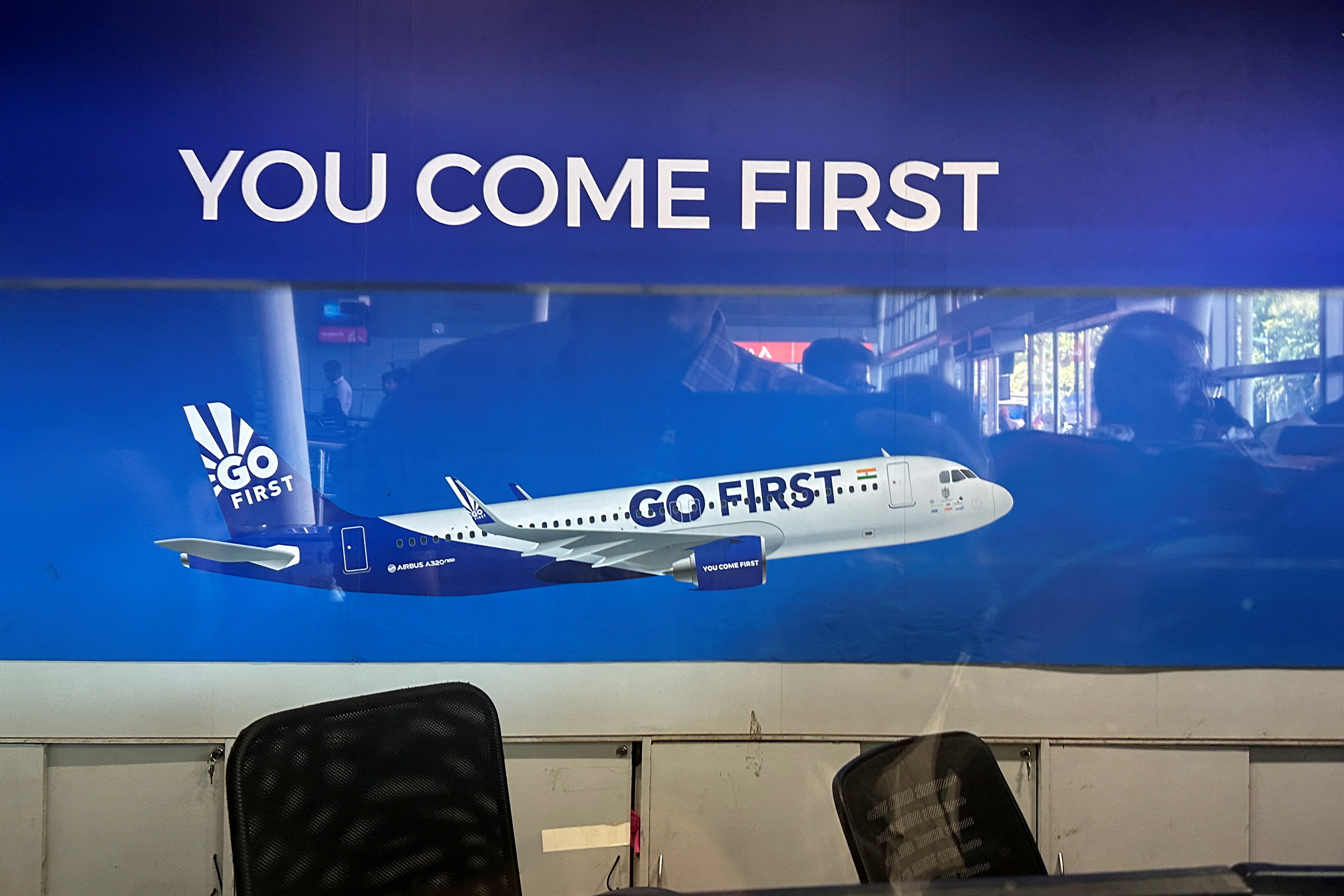
[1/2] Empty seats are seen at a Go First ticketing counter at Chhatrapati Shivaji International Airport in Mumbai, India, May 3, 2023. REUTERS/Francis Mascarenhas
NEW DELHI, May 10 (Reuters) – Go Airlines (India) Ltd was granted bankruptcy protection on Wednesday, boosting the country’s fourth-largest carrier’s chances of recovery, but lenders are expected to impose legal challenges to the recovery of planes.
The low-cost carrier, recently rebranded as Go First, fell into a financial crisis this year, sparked by what it called “faulty” Pratt & Whitney engines that grounded nearly half of its 54 Airbus (AIR.PA ) its A320neos. The US engine maker, part of Raytheon Technologies ( RTX.N ), said the claims were unsubstantiated.
Granting bankruptcy protection, the National Company Law Tribunal in New Delhi ordered a moratorium on Go First’s assets and leases. It also appointed Abhilash Lal of Alvarez & Marsal as interim resolution professional to take over management with immediate effect.
The resolution professional “shall ensure that retrenchment of employees shall not be done as a matter of course,” the tribunal’s 41-page order said. Go First has a staff of approximately 7,000.
The bankruptcy move adds to the headache for lessors, who have filed requests with India’s aviation regulator for the return of about 40 Go First planes after missing lease payments.
India has made it easier for lessors to return planes if airlines default on payments after joining in 2008 an international agreement known as the Cape Town Convention. But bankruptcy protection supersedes lenders’ repossession requests.
“The next step for the lessors is to approach the appellate tribunal … This is going to be a protracted legal battle,” said Ajay Kumar, managing partner at India’s KLA Legal who represents Go First lessors including Jackson Square Aviation and Bank of China Aviation.
He added that Go First’s problems would lead to higher lease premiums for Indian airlines.
That could be a sore point for the sector at a time when Indian Prime Minister Narendra Modi is touting the country’s emergence as an aviation powerhouse, with larger rivals IndiGo (INGL.NS) and the Tata Group’s Air India expanding aggressively.
Go First lessors also include SMBC Aviation Capital and CDB Aviation’s GY Aviation Leasing. They did not immediately respond to a request for comment.
Its voluntary request for bankruptcy protection to renegotiate contracts and debt marks a first for an Indian airline, and Chief Executive Officer Kaushik Khona, who was present as the order was read, praised the decision by tribunal as “historic”.
Go First, which had a 7% share of the world’s third-largest aviation market in March, is currently suspending all flights due to “operational reasons” and is not taking new bookings.
Reviving the airline – one of the hardest hit worldwide by the Pratt & Whitney engine problems – will not be easy, said Abhirup Dasgupta, a partner at HSA Advocates who specializes in insolvency law but is not involved in the proceedings. Go First.
This will require fresh funds and lenders may be wary of investing, he said.
Go First lists the losses of Central Bank of India Ltd (CBI.NS), Bank of Baroda Ltd (BOB.NS), IDBI Bank Ltd (IDBI.NS), and Deutsche Bank (DBKGn.DE) among financial lenders it has a debt of 65.21 billion rupees ($798 million).
The airline’s total liability to all creditors stands at 114.63 billion Indian rupees, including dues to banks, financial institutions, aircraft vendors and lessors.
It’s also unclear when the dispute with Pratt and Whitney will be resolved. Go First won an arbitration case in Singapore that ordered the US firm to send spare engines to the airline and has since approached a Delaware Court to seek enforcement.
Pratt & Whitney plans to oppose the move, a Delaware court filing showed Wednesday.
The Indian tribunal said the new resolution professional would take “all necessary steps including the implementation of the arbitral award”.
Reporting by Aditi Shah and Aditya Kalra; additional reporting by Arpan Chaturvedi; Editing by Jamie Freed
Our Standards: The Thomson Reuters Trust Principles.
